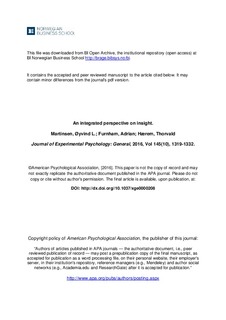An integrated perspective on insight
Journal article, Peer reviewed
Accepted version
Permanent lenke
http://hdl.handle.net/11250/2447383Utgivelsesdato
2016Metadata
Vis full innførselSamlinger
- Scientific articles [2181]
Originalversjon
Journal of Experimental Psychology: General, 2016, Vol 145(10), 1319-1332. 10.1037/xge0000208Sammendrag
The present study on insight is based on an integration of Kaplan and Simon’s (1990) information processing theory of insight, a cognitive style theory, and achievement motivation theory. The style theory is the Assimilator (rule oriented, familiarity seeking) - Explorer (novelty seeking, explorative) styles (Kaufmann, 1979). Our hypothesis was that the effectiveness of two types of search constraints (prior experience and solution hints) for solving insight problems is moderated by both cognitive style and achievement needs, and depending on optimal levels of achievement motivation for different task conditions. We tested the hypothesis in a randomized experiment in which three levels of achievement needs and one type of search constraint (solution hints were available or not available) were experimentally manipulated. In addition participants completed a cognitive style test, a measure of prior problem-solving experience (the second type of search constraint), and controls for intelligence. There were 476 participants (the mean age was 18.4 years). Results revealed two similar and significant three-way interactions between styles, achievement needs, and the two types of search constraints. The pattern of interaction supported the idea that stylistic competence for the task characteristics (with and without search constraints available), when combined with manipulated achievement needs, predicted performance in counterintuitive ways but in line with the classic achievement motivation theory. With appropriate stylistic competence for the task characteristics elevated achievement needs led to poorer performance. With less appropriate stylistic competence, performance improved with increasing motivation. Implications for information processing theory are discussed.
Keywords: cognitive style, insight, achievement motivation, information processing
Beskrivelse
This is the accepted, refereed and final manuscript to the article.
